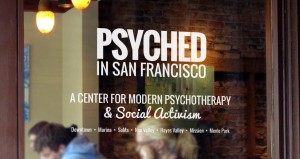Individual Psychotherapy Services
 Hello. Welcome to our practice. Psyched in San Francisco is a group of psychotherapists providing modern psychotherapy, marriage therapy, parent coaching, and relationship counseling. We believe the purpose of therapy is not to intimidate; it is to emancipate. To explore the way we limit our lives. The goal is autonomy, not dependence. It is not a therapist’s job to “cure” anyone because we don't see people from the lens of sick or well. Rather we take our years of advanced training to be catalysts for change for you by motivating, relating and educating. The real work is up to you, the person who comes to do the changing. (Paraphrased from NJ Center for Healing Arts)
Hello. Welcome to our practice. Psyched in San Francisco is a group of psychotherapists providing modern psychotherapy, marriage therapy, parent coaching, and relationship counseling. We believe the purpose of therapy is not to intimidate; it is to emancipate. To explore the way we limit our lives. The goal is autonomy, not dependence. It is not a therapist’s job to “cure” anyone because we don't see people from the lens of sick or well. Rather we take our years of advanced training to be catalysts for change for you by motivating, relating and educating. The real work is up to you, the person who comes to do the changing. (Paraphrased from NJ Center for Healing Arts)
Why we are a little different: Traditional psychotherapy often doesn’t take into account our modern busy lives, the sometimes non-conforming ways we live and love, economic and racial privilege, the politics and technology of the day and new unconventional and effective therapies like body-centered therapy. To us, social context matters to our collective psychological wellness because we are not living in a vacuum. As therapists we think, write and get active in our community because it makes us better therapists. Projects like Psyched in San Francisco Magazine and Sidewalk Talk are examples. Call us. Schedule 20 minutes with us. We know we can’t be a match for everyone and pride ourselves on making great connections with therapists outside of our center.
What should I do next?
Schedule a FREE 20 minute call with one or many of us. It is good to talk to a few people and make a good match for yourself.
As Seen In








Psyched in San Francisco Personal Therapists Treat:
|
|
Our Theoretical Orientation:
The individual therapists at Psyched in San Francisco are trained in the following theoretical orientations. For many people looking for help, they aren’t interested in theory or modality but for many, there is one form of treatment you have been prescribed or has proven successful to you in the past. Our clinicians have training in one or all of the following:
|
|
Research shows that the best predictor of success in therapy is actually
the quality of your relationship with your individual therapist.
Michael Lambert, one of the world’s leading psychotherapy researchers, estimates that the quality of the relationship a client and therapist have accounts for as much as 30 per cent of the variance from one client’s outcome compared to another.* This research is the foundation on which we formed Psyched in San Francisco—we are a center with many different kinds of skilled therapists to treat you and your loved ones in one location.
